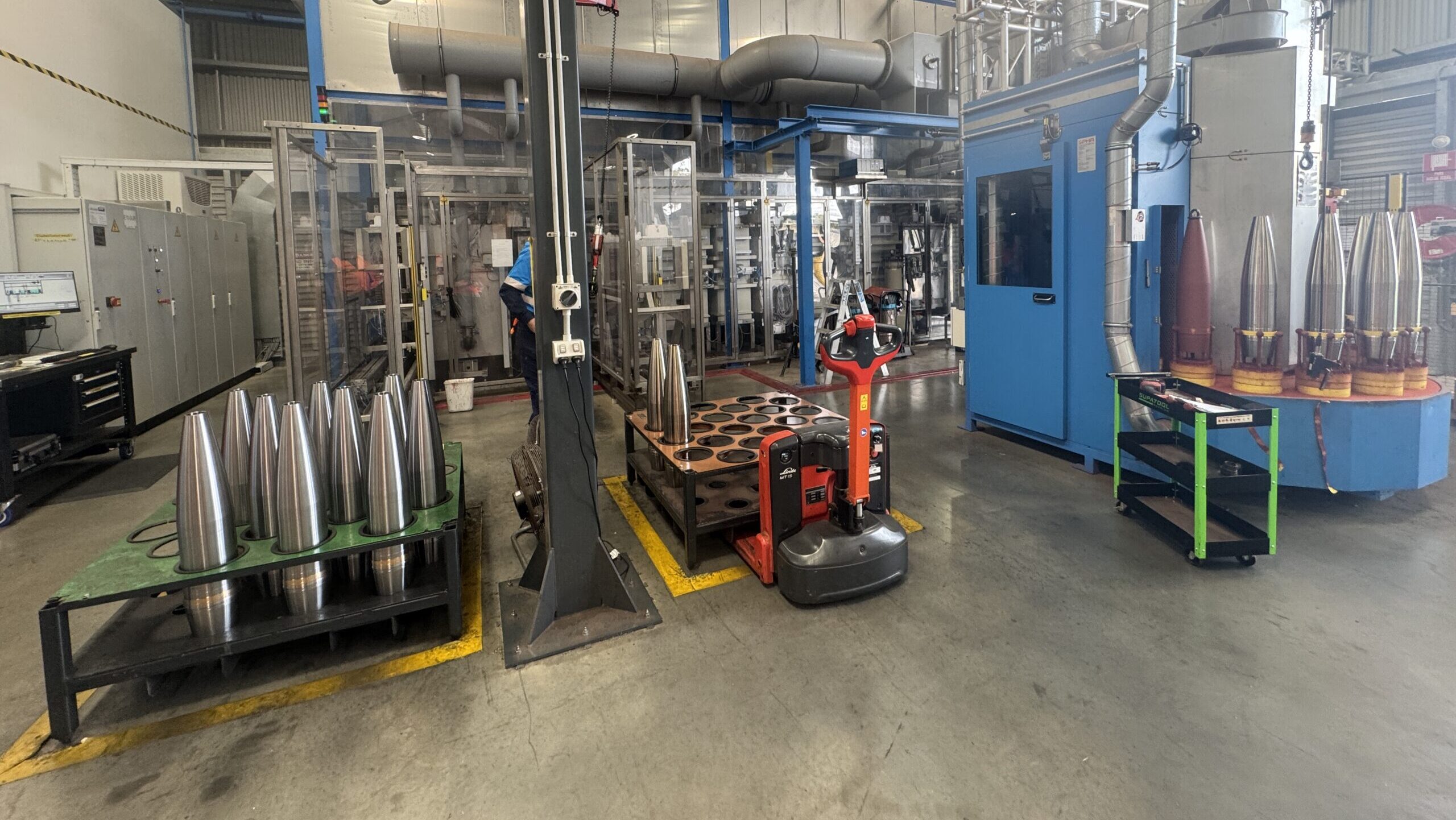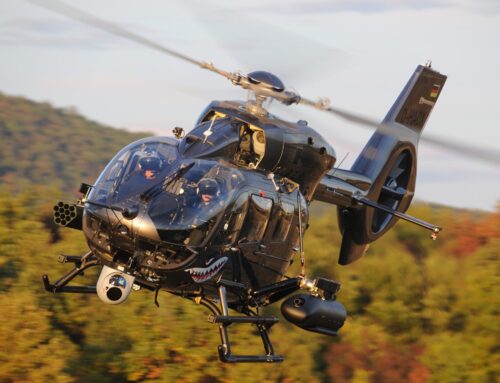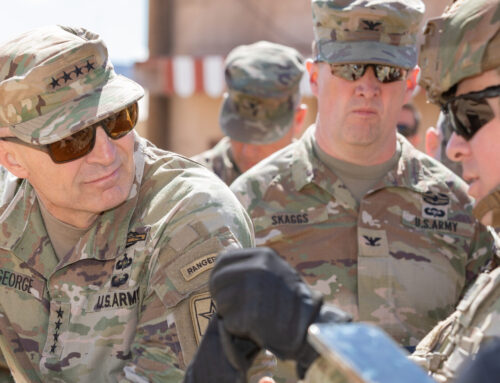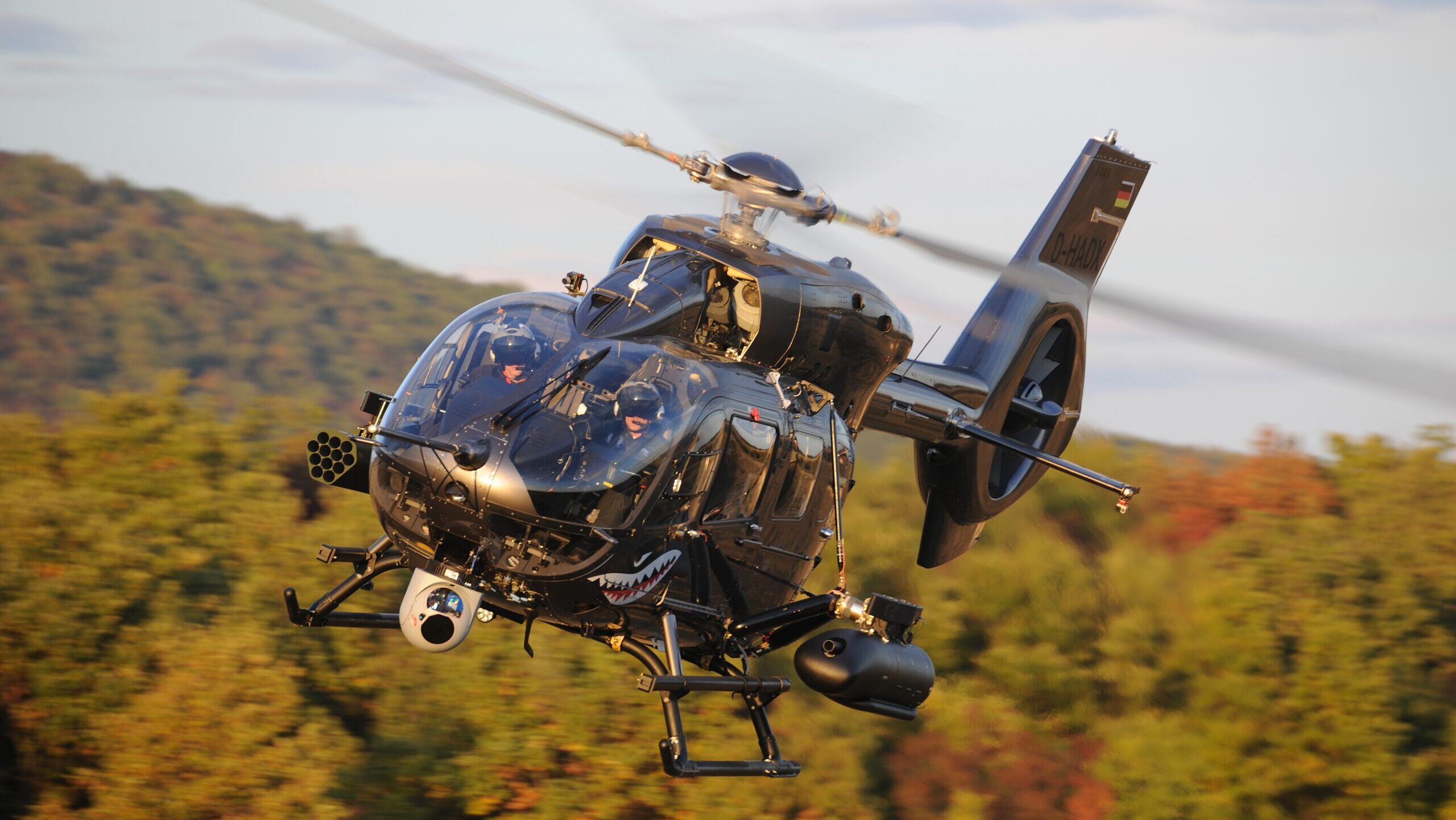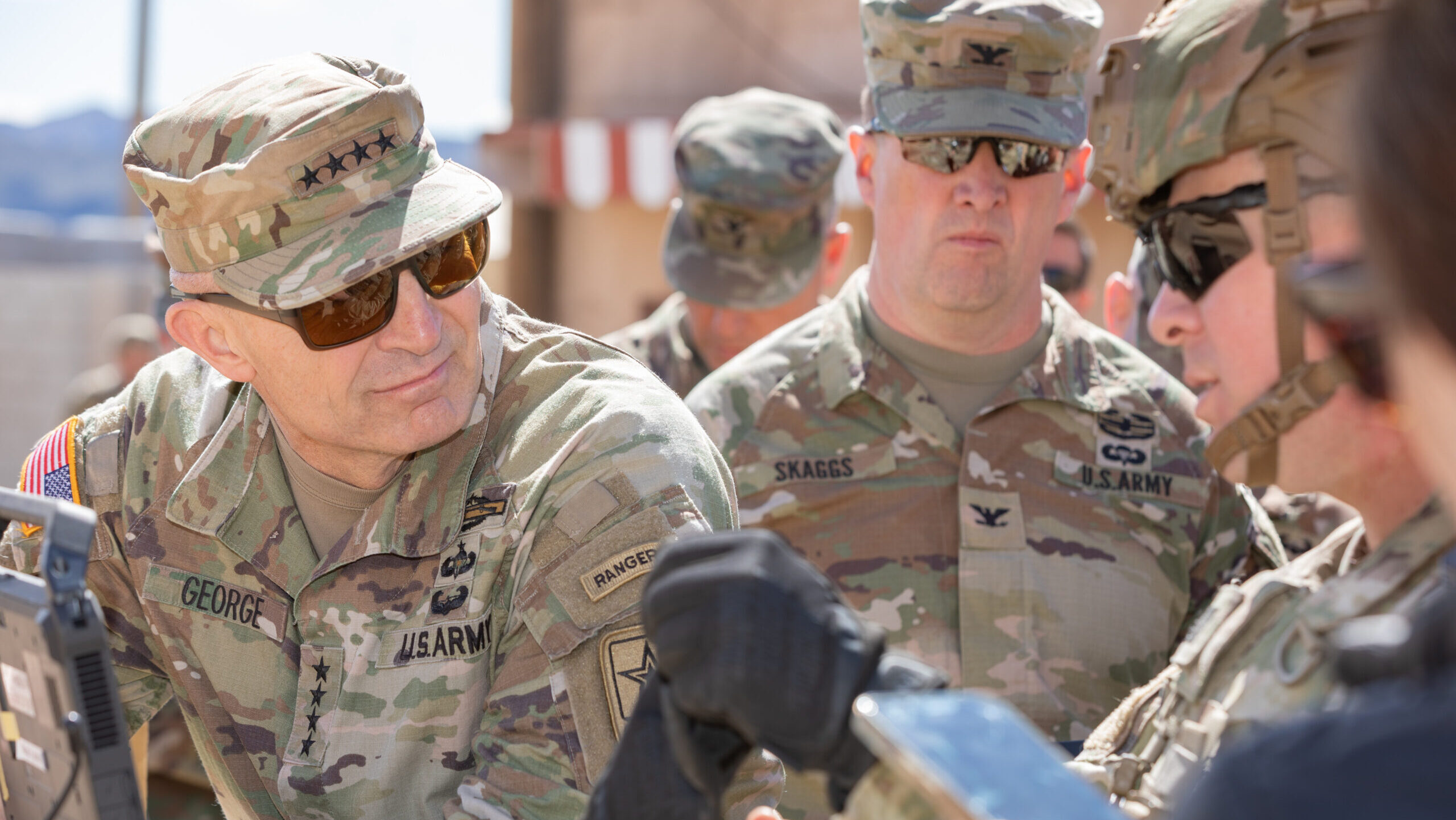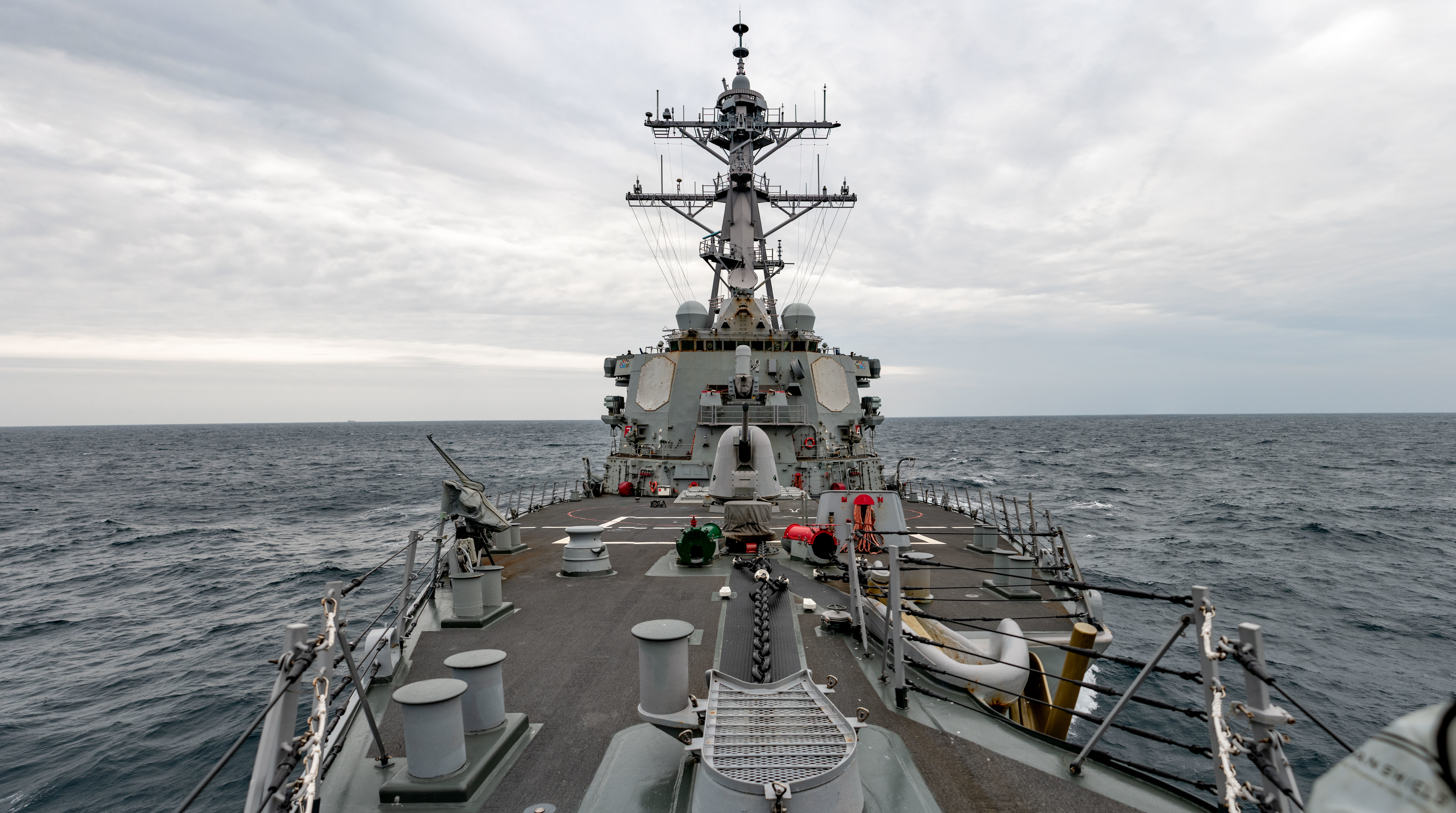One of the production stations for 155mm shells at the Maryborough, Queensland munitions plant, a joint venture between Rheinmetall of Germany and a privately owned Australian company, NIOA. (Colin Clark/Breaking Defense)
MARYBOROUGH, Queensland — A $17,000 AUD ($11,600 USD) forge, the only one of its kind, heats and hammers out 155mm artillery shells at a plant here, helping to supply Ukraine with critically needed ammunition, even though the Australian military does not directly sell them to the besieged European country.
Marvelously dexterous robots pick up the red-hot German steel bars sliced from a 2.5-ton slab and place them in the forge, pluck them out, douse them in chemically treated water and taper the nose of the shell. They are spin-balanced and checked to make sure they meet exacting standards.
About 10 percent of the shells fail and are remachined or scrapped if they can’t be fixed, company executives explained during a tour of the plant. Key machinery at the plant — designed by Australian firm NIOA with help from Germany’s Rheinmetall — is designed for this facility and is patented. It is the first munitions plant built in Australia since World War II.
The plant, a joint venture between the Rheinmetall (51 percent ownership) and NIOA, a privately-held company, is the only plant capable of producing larger artillery shells in this country, and it was built without direct funding from the Australian military.
NIOA CEO Rob Nioa told reporters during a tour that the plant required an initial investment of $90 million AUD ($62 million USD). NIOA invested tens of millions to its own cash, used a nearly $30 million-dollar (AUD) grant from the federal government, and received a few million more from the Queensland state government, concerned because the town of Maryborough had the highest sustained unemployment rate in the state. There were personal reasons as well for Nioa to build the plant there: The family’s business started in Maryborough in 1973, where some family members still live.
Back in 2017 NIOA won a contract with the Australian Army not to directly produce the ammunition, but to “source” it from “international partners,” including another Rheinmetall subsidiary. At the time, Nioa said, “Australia had lost the ability to forge an in-service shell.”
“We thought it was an important capability to bring on-shore — and we put some proposals to government that were ultimately supported, originally through a regional jobs program,” Nioa said.
Construction began in 2020, and the plant currently employs roughly 120 workers, with that number, Nioa’s CEO said, predicted to rise over the next several years.
Part of the forging process at the Maryborough munitions plant, a joint venture between Germany’s Rheinmetall and a privately owned Australian company, NIOA. (Colin Clark/Breaking Defense)
The shells, which NIOA executives pointedly call the most desired military product in the world right now as the conflict in Ukraine has shown their utility, are currently rolling off the line at the rate of 20,000 annually. Company officials say they plan to ramp things up fivefold to 100,000 each year.
But these are unfilled German DM 121 shells because Australia doesn’t make the fuses or the explosives to fill them, despite the country’s policy of what it calls being “sovereign.” Instead of making the complete shells — from shell casing to fuse and explosive — the Australian government appears to have made the choice of investing in long-range precision strike weapons such as HIMARS, the Joint Strike Missile and the rocket motors associated with them, and importing the finished 155mm shells from elsewhere.
Meanwhile, NOIA-made shells go to Germany, and company officials say, where they are filled with explosive, and receive primers and fuses. From there, many are sent to Ukraine as part of German security packages.
The Nioa CEO believes more can be done here to help both Australia and the western effort to help Ukraine survive the Russian invasion, especially if the government more fully invests in each stage of ammo production.
“So I think we could, with some additional investment, we could significantly increase our output, and we could do more to support the combined allied effort, even if Australia doesn’t need more right now, even if Australia is okay with its importer supply, I think Australia could lean forward more and actually support the allied effort, including the US and its preparations in the Indo-Pacific region,” he said.
An explosives plant at Mulwala in New South Wales could produce TNT, although the Australian Army prefers insensitive munitions that can be transported and stored more safely. Fuses could be built at Benalla, a remote area in the state of Victoria, though it would require a new facility there.
“It’s just a matter of getting a demand signal from the customer, the Australian government saying they want that to occur,” Nioa said.
Nioa said that should probably occur at a government facility. The obvious choice would appear to be the government-owned munitions plant at Benalla, Victoria. Nioa did not have an obvious answer to producing primer for the shells, which he called a “bottleneck” for a range of Australian munitions.
(NIOA provided transportation, food and lodging to reporters for the two-day trip to Brisbane and Maryborough.)


